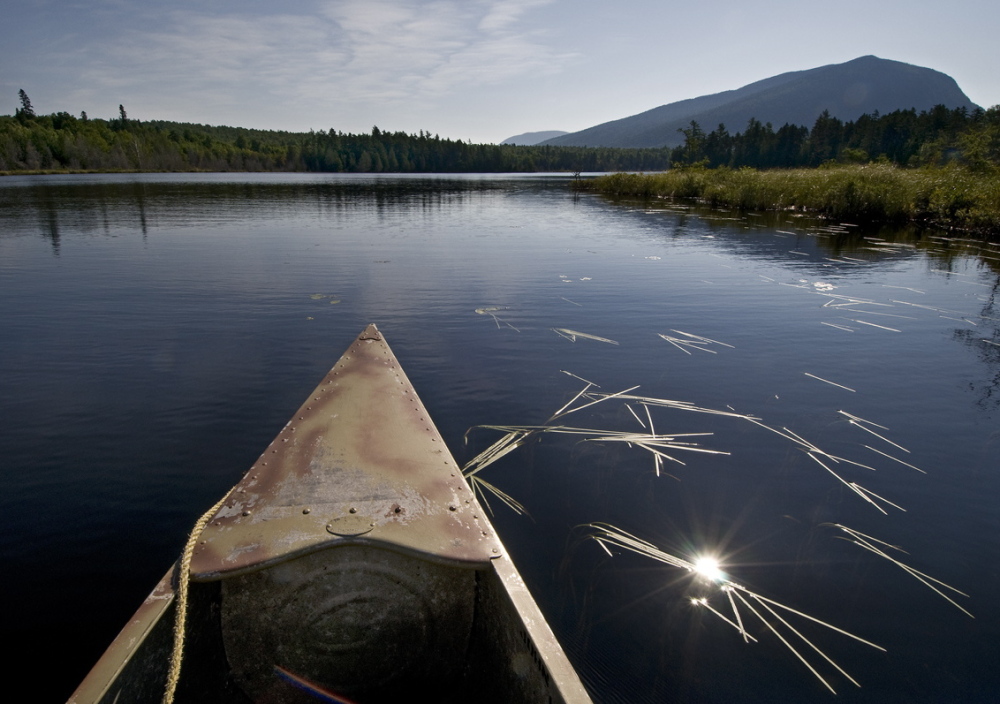This weekend, a group of more than a dozen people are embarking from Moose-head Lake on a 300-mile canoe trip to commemorate the 150th anniversary of the publication of Henry David Thoreau’s book, “The Maine Woods.” The group of guides, scholars and Penobscot Indians plan to retrace the third of Thoreau’s three trips through Maine’s remote forestland.
The odd thing about the trip is it does not fall on any of the anniversaries of Thoreau’s trips to Maine. Those took place in 1846, 1853 and 1857. In fact, Thoreau wasn’t even alive when his book was published 150 years ago. He died two years earlier, in 1862.
However, like all good commemorative events, the Maine Woods Discovery canoe expedition stems from a good idea: Get people out playing in the Maine woods.
Certainly Thoreau would have been a fan of that, given he was the guy who praised Maine’s northern forestland with phrases like: “I looked with awe at the ground I trod on, to see what the Powers had made there, the form and fashion and material of their work.”
Largely viewed as a work of historical significance, “The Maine Woods” captured Thoreau’s three trips through the north woods and across the rivers, lakes and mountains there. Many credit him with being one of the early pioneers for conservation.
The Maine Woods Discovery partners embarking on this epic canoe trip are more than a group of nature-based businesses trying to attract tourists. The Maine Woods Discovery partners are a consortium of like-minded outdoors people who want to elevate the image of Maine’s vast forestland. They include the owners of outdoor lodges, guiding services and conservation groups.
“We’re really interested in promoting high-quality guided experiences in the Maine woods,” said Mike Wilson, the program director for the Northern Forest Center in South Portland and director of the new Maine Woods Discovery group.
“This grew out of an interest in pursuing sustainable economic strategies for this region. As we move forward, we’re looking at ways to bring in more traditional lodging facilities, ways to bring in events and ways to make the Maine woods a well-known brand.”
Coming together to symbolically embrace the Maine woods by paddling Thoreau’s canoe trail will be an epic, eye-catching adventure that Wilson hopes spreads quickly via social media as the group blogs about the adventure. But the work of marketing Maine’s woodland well is long overdue, Wilson said.
The Maine Woods Discovery effort to stimulate economic activity in northern Maine through high-level outdoor tourism opportunities is separate from the effort to create a national park there, he said.
And bringing attention to Maine’s northern towns by celebrating the unique historical events there is not a new idea.
In the past seven years the Natural Resource Education Center in Greenville has held an annual Thoreau-Wabanaki Festival by Moosehead Lake.
The Maine Woods Discovery partners think their canoe trip over the next two weeks will spark many more such events in northern Maine.
Bryan Wentzell, the Maine policy director for the Appalachian Mountain Club and a member of the canoe expedition, has seen it happen.
In the woodland to the east of Greenville, the AMC began its “Maine Woods Initiative” a decade ago. This winter it filled three sporting camps situated in 68,000 acres of remote forestland owned by AMC. In the 10 years since it bought that first sporting camp, AMC’s Maine woods destination has grown into a wilderness tourist destination with a staff of 30.
“We bought Little Lyford Pond in 2003, and the Katahdin Iron tract (of land) shortly after. The project overall has gone even better than we imagined,” Wentzell said. “Last winter was our busiest ever. And one of our goals was to grow the Maine woods into a world-class destination.”
Wentzell said through the efforts made by the Maine Woods Discovery partners, further eco-tourism opportunities could be discovered by guides and small business owners across northern Maine.
One Maine woods fan who will be following the canoe journey will be the photographer who illustrated Thoreau’s trip for a book and photographic exhibit: Texan Scot Miller, whose Thoreau exhibit is currently on display at the Harvard Museum of Natural History.
Miller said the years he spent producing his exhibit did what the Maine Woods Discovery group is attempting. Miller tried to bring attention to the raw, savage beauty that captured Thoreau’s attention, and continues to draw outdoor explorers today. Miller also said that as he traveled through the Maine North Woods, he found the grandeur of the lakes and woodland like nothing he’d seen before.
“The Maine woods is an incredible place. It has beautiful rivers and lakes,” Miller said. “You go up to the North Woods and there are all these beautiful natural lakes and, for the most part, free-flowing rivers. The East Branch of the Penobscot River is an incredible stretch of river. It’s probably very similar to what Thoreau saw. A lot of places they’re going to they will see things that obviously were not there then. But at times they’ll also stand in places and it will seem he could be there with them.
“I think Mainers do appreciate it. But sometime in your own state, you don’t even know what you have. Mainers have a wealth of riches up north.”
Staff Writer Deirdre Fleming can be reached at 791-6452 or at: dfleming@pressherald.com
Twitter: FlemingPph
Send questions/comments to the editors.


